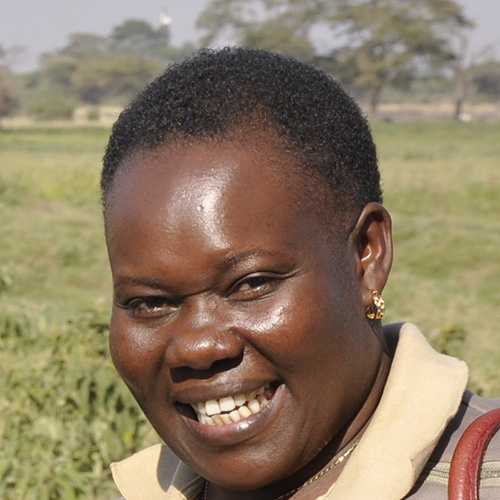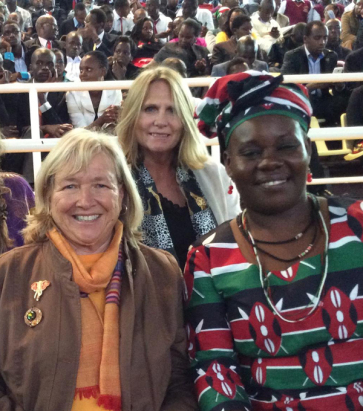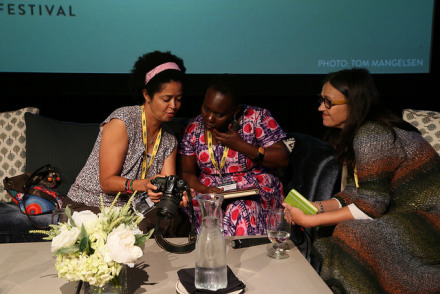|
By: Lizzie Stallings This week at the Film Festival, I had the pleasure of talking to Dr. Winnie Kiiru, the founder of ConservationKenya and contributor to the Conservation Summit panel, “Empowering Community.” Born in central Kenya, Dr. Kiiru has spent her life as a biologist, conservationist, advocate for human development and contributor to the Elephant Protection Initiative in Africa. She is a research associate of the Amboseli Trust for Elephants and she runs a human-elephant conflict project outside of Amboseli National Park. Dr. Kiiru is incredibly well spoken while simultaneously impassioned. However, she never failed to sprinkle that directed energy with humor. Below I’ve transcribed our conversation. *** How old were you when you knew this was what you wanted to do? “When I was a young girl, I always wanted to be a vet, not because of loving animals, but because when the vet came to my grandmother’s, everything stopped. My grandmother would dress really beautifully, like a VIP was coming. The vet always wore in a white coat with a bag for looking after the cattle. The whole atmosphere around him was so grand and I thought, that’s who I want to be. Then I went to university and studied botany and zoology. What I didn’t know is that I soon after University, I would get a job with the Kenya Wildlife Service and then straight away, I was research assistant to Joyce Poole. My first job was to count elephants in forests, where you literally had to walk through the forest, count piles of dung then use a formula to convert these numbers into elephant population. I counted a lot of poo in my first years.” Sounds delightful! What made you interested in conservation and human development, then? “I did my masters at the University of Zimbabwe, which meant I had to do a whole number of units on social development, ecology, and community. They deliberately bring social thinking into the mind of a scientist. At that time, human-elephant conflict was becoming such a big issue, but none of us biologists knew how to measure the impact, deal with politics, or solve the problem. So many biologists spent all of their time studying animals and natural systems and forgetting human beings impacted those systems. Initially, I didn’t really care what was going on with people either, but then these problems started – every day we would get serious calls, elephants with spear wounds, demonstrating on the street; I went to a number of these meetings and Joyce [Poole] thought I was a natural because I could communicate easily with these individuals. The Maasai people and I really connected. The Maasai people had always been tolerant of the elephants, so these spear wounds and demonstrations were new. No one had really spent time trying to understand how the people were changing or what they saw as their future with wildlife. No one was studying the strategies elephants adopted to survive in this changing landscape.” So at this point, it seems you had a new understanding for the importance of collaboration between environmental protection and the humans living in those areas. How did you proceed? As soon as I finished my Ph.D. (in Biodiversity Management with a focus on human-elephant conflict), I knew I needed a vehicle to help me communicate my passion for human development. Note: Dr. Kiiru’s foundation, ConservationKenya, became this vehicle. I kind of thought of calling it Conservation-and-Human-Development-Kenya but it was too long. Still, I knew that the name had to define me, the conservationist, but really, really I wanted to spend a lot of time just working on individual community issues. Is ConservationKenya consulting? Do the communities come to you or you to them? “I don’t know the answer. It’s organic. It’s just grown on me. It’s a passion project. Another thing that bothers me a lot is that many young Kenyans don’t see Conservation as something that is authentic for them. They are clouded by the tourism industry. People who are non-Kenyans—Europeans and white conservationists—they have been so involved. If you show a conservation film, people will say, ‘Why are you watching things for white people?’ I know that’s not true. Protecting the forests, parks, etc, lies in the young people appreciating the need to preserve it.” And how do you make that happen? “I have developed a study center to bring kids for a weekend where they can tromp around. Where I live, if you take a walk in the morning, you will walk into a head of giraffe, and Mt Kilamanjaro is about 70 km away. A Kenyan child could finish a degree in wildlife ecology without ever having been in a national park without being controlled by teachers. This program allows them basically to do whatever they like. Some might do a vegetation survey, anything. I don’t care what they do, and I don’t care about the results. I just want them to experience the wild. After that, they go to the Maasai, where they live so close to the land on so little but with such a passion for their cattle and goats. These kids get a total education, learning that you can live a pretty good life next to the land without destroying it. I’ve done this for the last two years, done about 500 kids just coming through and they can come for free – I don’t charge them anything. All they have to do is come with food and cook it themselves. I would like to grow that some more because every child I have brought for that trip just is different when I meet them later on in a later course.” So it seems this wildlife exposure program is very oriented around understanding simplicity as a way of life. How then, do you define development? “I’m convinced that the Maasai way of life is great, and I’m also convinced that certain aspects of their culture cannot respond to life as it is. For instance, keeping 50% of the population off the table in terms of discussing what goes on with their lives. Why aren’t the women participating, excluded from any formal trading, they don’t go to the market, excluded from meetings, but they are the ones who are interacting first hand with the land and the children. Investing in the women and giving them basic skills and education is not counter to a simple way of life. My view of development is not so much stuff, but it’s how much you’re represented in the decisions that affect you. Is it fair to be voiceless just to preserve a culture? So if I give you a voice, and having that voice somehow makes you start to desire a bicycle so you can move faster, that’s a story for another day. I just want you to have a voice.” What is your proudest accomplishment to date? “I think what makes me proud is that I have remained an authentic African woman. I’ve had great privileges, a great education – not very many people in Africa have a Ph.D., and not enough people in Africa really spend enough time looking at the outdoors. I have done this, and still, I have two children that I love dearly and are very successful. I have a home, and I interact very comfortably with my family and with the world. I feel very happy that I can go home and visit the village and be welcome. I can go to the Clinton Global Initiative and sit at the round table with Hilary Clinton, or I can sit on the ground and drink tea with the Maasai women. I don’t feel small with Hilary and I don’t feel large with the Maasai women. So I’m here in Jackson Hole talking about conservation, interacting with the best in the world and really watching cutting edge technology and its far from home and my reality, and yet I don’t feel lost.” What is the hardest aspect of your work in conservation? “It’s very male dominated in my country. I have to always walk the fine line between when I’m trying to change something to not be relegated to having “empty female passion.” I’m a very intelligent woman and I cannot have my views trashed on the basis of being emotional. You think you have a problem, just try and come to my part of the world. What I wear, how I say things, how I choose to arrive, all of those things are judged each one and they will be used against me to make me look small. I literally have to revise the script as home and take out anything that might be reinvented as just pure raw emotion. I need to not bring on attention to myself that will have me just put down as female, hormonal, estrogen oriented.” Do you think that will ever change? “[With] my son, maybe. Maybe the next generation. It’s changing slowly, but… there’s hope. [It starts with] the generation of boys brought up by strong mothers. My son dates a woman that went to Yale. He just lets her do whatever. Who asked him? The women, it’s in our hands. You have to bring up boys who are so secure in themselves that they don’t feel they have to look so good they have to be tough on women. If you bring them up to realize it’s just fine, then they can let us be.” *** Below, you’ll find one of Dr. Kiiru’s favorite songs, “African Girl” by Naomi Wachira, a Kenyan singer-songwriter based in Seattle. Certain parts of many of her songs are sung in Kikuyu, the native Kenyan language shared by Dr. Kiiru herself!
0 Comments
Leave a Reply. |
Archives
March 2024
Categories
All
|
Contact UsJackson Wild
240 S. Glenwood, Suite 102 PO Box 3940 Jackson, WY 83001 307-200-3286 info@jacksonwild.org |




 RSS Feed
RSS Feed